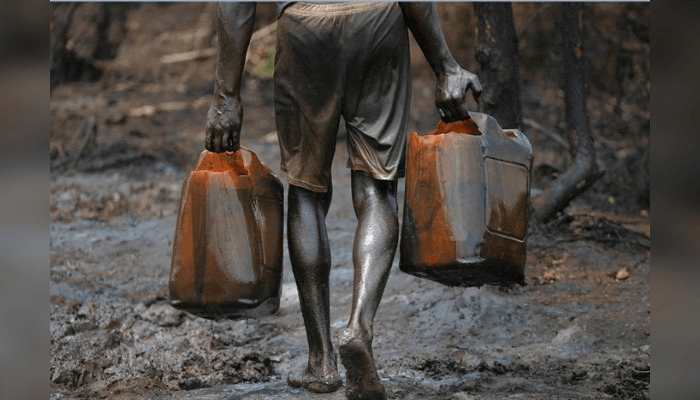Transparency International (TI), a leading anti-corruption watchdog, has released a report alleging that Nigeria’s thriving crude oil theft business flourishes due to widespread military complicity.
The report, written in partnership with the Civil Society Legislative Advocacy Centre(CISLAC) and first published in 2019, detailed a network of illegal actors, including rogue officials, security personnel, and organized crime syndicates, who siphon billions of dollars’ worth of oil annually.
It also noted that the researchers observed busy scenes where refined oil products were unloaded in Port Harcourt, Abonnema Wharf Jetty, Creek Road jetty, Woji jetty, Marine Base Jetty and Iwofe Jetty within the period.
The report claimed that military involvement in the menace is seen at the tapping points and bush refining during the transportation stage.
According to the report titled, “Military Involvement In Oil Theft in The Niger Delta: A Discussion Paper: “The Niger Delta is the most important oil-producing region in Africa with its oil providing 70 per cent of Nigeria’s government revenue. However, alongside the legitimate trade in the Delta’s oil products, there is a lucrative and organised illicit oil trade that reported loss of Nigeria 200,000 barrels of oil every day”.
“Participants in oil theft also called oil bunkering, steal oil from pipelines, refine the oil, and then sell it to local, regional and international markets. It is a profitable criminal industry that cost the Nigerian government N3.8trillion (approximately UD$1056billion) in 2016 and 2017,” the report further stated.
It noted that beyond the economic loss, “the human cost and environmental pollution have similarly, been significant”. Regular spills of oil caused by oil theft and sabotage it said, have “polluted the waterways, contaminated crops and other food resources, and released toxic chemicals into the air”. According to the research, in 2017, reports emerged that oil spills doubled the risk of child mortality in the Niger Delta.
“Though the Joint Military Task Force, JTF was deployed to the region in the early 2000s to checkmate militancy and protect pipelines from oil theft, there have been indications that some JTF members are complicit in and often benefit from precisely the pursuit and are mandated to eradicate; the illicit oil industry”.
Categorically, the report stated: “Existing research suggests that members of the Nigerian Armed Forces have enabled and benefitted from the illegal trade in a number of ways. Often this benefit comes from providing protection both ensuring military officials turn a blind eye to illegal activity and protecting oil thieves’ access to extraction points from rivals in exchange for financial bribes. A Chatham House report has suggested that JTF officers have stood guard at illegal tap points and provided armed escorts to ships loaded with stolen crude.
“Similarly, a 2015 report from the stakeholder DemocracyNetwork, SDN reports JTF members’ active involvement in oil theft, from providing security to local oil thieves as they install taps that divert oil from pipelines to collecting transportation taxes for vehicles transporting oil and demanding regional security payments from illegal oil refineries for ongoing protection. The media also suggested that soldiers know the locations of the illegal cooking pots but are often paid off not to close down oil theft rings and maintain an overview of the illegal operations.
Six independent researchers conducted interviews and focus group discussions in the region between February and July 2018 to gauge the scale of practice and depth of military involvement. Discussions occurred in Nembe and Yenagoa, Bayelsa State and Port Harcourt, Rivers State. Participants were drawn from local communities familiar with illegal oil operations. The researchers further observed busy scenes at several illegal oil refining points.
The exercise’s outcome revealed the military’s complicity in protecting operators or feigning a blind eye in exchange for money.
“One participant who is familiar with illegal bunkering in Bayelsa State indicated that tapping occurs with the knowledge and complicity of military personnel”. According to him, the military, “know the location of every tapping point and the names of every individual or group who controlled them”.
In Cross River State, researchers were told of the Nigeria National Petroleum Corporation, NNPC state-owned pipeline being routinely targeted for oil theft operations.
“The extraction points identified by interviewees were less than one kilometre from the Nigerian Navy Base, NNSVictory and the Nigerian Navy training School. The proximity of tapping points close to military establishments suggests at best, awareness of the scheme and at worst, active participation”.
The vulnerable, especially women, pay up fast to avoid harassment. ”Women are also involved and pay up promptly being more vulnerable”.
“My waterfront is a joint where all the forces, army, police, navy, in Rivers State, come to collect their share”, a highly-placed stakeholder stated in the report.

